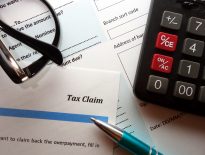
What home office expenses are tax deductible?

Home Office expenses fall into the following categories:
- Running expenses relating to income earning activities
- Telephone expenses
- Depreciation on equipment
- Occupancy expenses where the home is a place of business
RUNNING EXPENSES
A deduction can be claimed for home office running expenses comprising of electricity, gas and depreciation of office furniture (e.g. desk, tables, chairs, cabinets, shelves, professional library) in the amount of:
- The actual expenses incurred; or
- 52 cents per hour
Like making a motor vehicle claim, diary/logbook evidence should be maintained for a 4-week period to establish a pattern of working from home and justify the number of hours you are claiming.
No deduction is allowed where no additional costs are incurred e.g. you work in a room where others are watching TV.
You will need receipts for:
- home office equipment used for work purposes
- repairs relating specifically to the home office or furniture and equipment used for work purposes
- cleaning expenses of home office
- any other day-to-day running expenses for the home office
- diary entries to record your small expenses ($10 or less) totalling no more than $200
TELEPHONE (INC. MOBILES) + INTERNET COSTS
If work or business calls can be identified from an itemised telephone account, then the deduction can be claimed for the work or business-related portion of the telephone account. A representative four-week period will be accepted as establishing a pattern of internet and telephone use for the entire year.
Telephone rental expense may be partly deductible if you are “on call” or required to contact your employer or client on a regular basis.
DEPRECIATION ON EQUIPMENT
Depreciation on home office equipment including office furniture, carpets, computer, printer, photocopier, scanners, modem etc. used only partly for work or business purposes can be apportioned.
The claim is based on a diary record of the income related and non-income related use covering a representative four-week period. The diary needs to show:
- The nature of each use of the equipment
- Whether that use was for an income producing or non-income producing purpose
- The period for which is was used
OCCUPANCY EXPENSES
Claims for occupancy expenses are allowed only if the home is used as a place of business. Occupancy expenses include rent, mortgage interest, water rates, repairs, house insurance premiums.
The claim can be made as an apportionment of total expenses incurred on a floor area basis.
Warning: Being able to claim theses expenses may affect your ‘main residence exemption’ for capital gains tax purposes if you sell your house in the future.
WHEN IS A HOME A PLACE OF BUSINESS?
The following factors, none of which is necessarily conclusive on its own, may indicate whether, or not, an area set aside has the characteristics of a place of business:
- the area is clearly identifiable as a place of business
- the area is not readily suitable or adaptable for use for private or domestic purposes in association with the home generally
- the area is used exclusively, or almost exclusively, for carrying on a business, or
- the area is used regularly for client or customer visits.
If you use your home to carry out income producing activities as a matter of convenience, you are not entitled to a deduction for occupancy expenses. It would be rare for an employee to be able to claim occupancy expenses.
With the recent ATO crackdown on certain deductions, it is important to keep records of any expenses and diary records to substantiate your home office use.
If you have any queries in relation to any of the above, as always please feel free to contact the WLF team.

